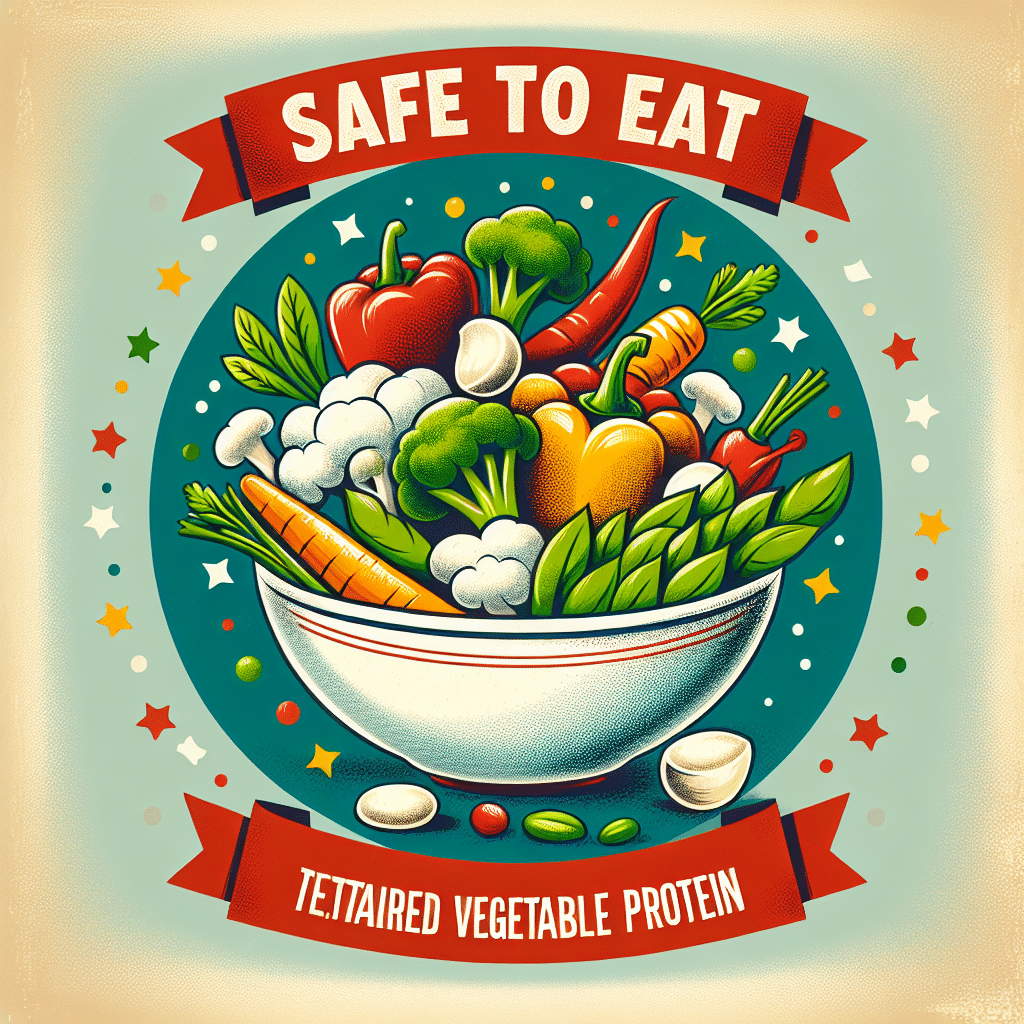Is Textured Vegetable Protein Safe To Eat?
-
Table of Contents
- Textured Vegetable Protein: A Safe and Nutritious Meat Alternative?
- What is Textured Vegetable Protein?
- Nutritional Profile of TVP
- Health Benefits of Consuming TVP
- Potential Concerns and Considerations
- Is Textured Vegetable Protein Safe to Eat?
- Environmental Impact of TVP
- How to Incorporate TVP into Your Diet
- Conclusion: Embracing TVP as a Safe and Nutritious Option
- Discover ETprotein’s High-Quality Protein Products
Textured Vegetable Protein: A Safe and Nutritious Meat Alternative?

Textured Vegetable Protein (TVP), also known as textured soy protein (TSP), is a highly versatile food ingredient derived from soybeans. It’s been a staple in vegetarian and vegan diets for decades, offering a protein-rich meat substitute that’s both cost-effective and environmentally friendly. However, with the rise of plant-based diets, many consumers are questioning the safety and nutritional value of TVP. This article delves into the science behind TVP, its health implications, and whether it’s a safe choice for your diet.
What is Textured Vegetable Protein?
Textured Vegetable Protein is made from defatted soy flour, a by-product of soybean oil extraction. The process involves removing the fat from soybeans, leaving behind a high-protein, fibrous residue. This residue is then cooked under pressure, extruded, and dried to produce a variety of textures and shapes. TVP is known for its ability to absorb flavors and mimic the texture of meat, making it a popular ingredient in many vegetarian and vegan recipes.
Nutritional Profile of TVP
TVP is celebrated for its impressive nutritional profile. It’s rich in protein, containing all the essential amino acids needed by the body, making it a complete protein source. Additionally, it’s low in fat and carbohydrates, high in fiber, and contains various vitamins and minerals such as iron, magnesium, and phosphorus. Here’s a breakdown of its nutritional benefits:
- High-quality protein content
- Low in fat and calories
- Rich in dietary fiber
- Contains essential vitamins and minerals
- Cholesterol-free
Health Benefits of Consuming TVP
Consuming TVP can offer several health benefits, particularly for those looking to reduce meat consumption or follow a plant-based diet:
- Weight Management: The high protein and fiber content in TVP can help in feeling full longer, potentially aiding in weight management.
- Heart Health: Being low in fat and cholesterol-free, TVP can contribute to a heart-healthy diet.
- Muscle Maintenance: As a complete protein, TVP supports muscle growth and repair, which is crucial for overall health.
- Blood Sugar Control: The low glycemic index of TVP makes it beneficial for blood sugar regulation.
Potential Concerns and Considerations
Despite its benefits, there are some concerns associated with TVP consumption:
- Soy Allergies: As a soy product, TVP is unsuitable for those with soy allergies.
- Phytoestrogens: Soy contains phytoestrogens, which have been the subject of debate regarding their effects on hormone levels, though most research indicates they are safe in moderation.
- Genetically Modified Organisms (GMOs): Many soy crops are genetically modified, raising concerns for those who prefer non-GMO foods. However, organic TVP options are available.
- Processing: Some argue that the processing involved in making TVP may reduce its nutritional value, although it remains a rich protein source.
Is Textured Vegetable Protein Safe to Eat?
The safety of TVP has been extensively studied, and it is generally considered safe for most people when consumed as part of a balanced diet. The Food and Drug Administration (FDA) recognizes soy protein, from which TVP is made, as safe and has granted it Generally Recognized as Safe (GRAS) status. Moreover, numerous studies have shown that moderate consumption of soy products, including TVP, can be part of a healthy diet and may even offer protective benefits against certain diseases.
Environmental Impact of TVP
From an environmental perspective, TVP is a sustainable food choice. The production of TVP requires significantly less water, land, and energy compared to animal protein sources. This makes it a more eco-friendly option for those looking to reduce their carbon footprint through dietary choices.
How to Incorporate TVP into Your Diet
TVP can be used in a variety of dishes as a meat substitute. Here are some ideas for incorporating TVP into your meals:
- Use it as a ground beef substitute in tacos, chili, or spaghetti sauce.
- Add it to soups and stews for extra protein.
- Include it in vegan or vegetarian burgers and meatballs.
- Mix it into breakfast scrambles as a stand-in for scrambled eggs.
Conclusion: Embracing TVP as a Safe and Nutritious Option
In conclusion, Textured Vegetable Protein is a safe, nutritious, and environmentally friendly food that can be a valuable part of a balanced diet. Its high protein content, low-fat profile, and versatility make it an excellent choice for those looking to reduce meat consumption or follow a plant-based diet. While there are some considerations to keep in mind, such as soy allergies and GMO concerns, these can often be mitigated by choosing organic and non-GMO certified products.
Discover ETprotein’s High-Quality Protein Products
If you’re interested in exploring the benefits of plant-based proteins, ETprotein offers a range of high-quality protein products that are perfect for health-conscious consumers. Their selection includes organic rice protein, pea protein, and various seed proteins, all characterized by a neutral taste, non-GMO, and allergen-free attributes. With purity levels exceeding 98%, ETprotein’s offerings cater to a diverse range of industries and dietary needs.
About ETprotein:
ETprotein, a reputable protein and L-(+)-Ergothioneine (EGT) Chinese factory manufacturer and supplier, is renowned for producing, stocking, exporting, and delivering the highest quality organic bulk vegan proteins and L-(+)-Ergothioneine. They include Organic rice protein, clear rice protein, pea protein, clear pea protein, watermelon seed protein, pumpkin seed protein, sunflower seed protein, mung bean protein, peanut protein, and L-(+)-Ergothioneine EGT Pharmaceutical grade, L-(+)-Ergothioneine EGT food grade, L-(+)-Ergothioneine EGT cosmetic grade, L-(+)-Ergothioneine EGT reference grade and L-(+)-Ergothioneine EGT standard. Their offerings, characterized by a neutral taste, non-GMO, allergen-free attributes, with L-(+)-Ergothioneine purity over 98%, 99%, cater to a diverse range of industries. They serve nutraceutical, pharmaceutical, cosmeceutical, veterinary, as well as food and beverage finished product distributors, traders, and manufacturers across Europe, USA, Canada, Australia, Thailand, Japan, Korea, Brazil, and Chile, among others.
ETprotein specialization includes exporting and delivering tailor-made protein powder and finished nutritional supplements. Their extensive product range covers sectors like Food and Beverage, Sports Nutrition, Weight Management, Dietary Supplements, Health and Wellness Products, and Infant Formula, ensuring comprehensive solutions to meet all your protein needs.
As a trusted company by leading global food and beverage brands and Fortune 500 companies, ETprotein reinforces China’s reputation in the global arena. For more information or to sample their products, please contact them and email sales(at)ETprotein.com today.












